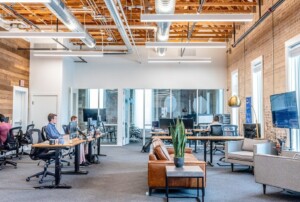
We are living during interesting times. Times of extreme change that are pivotal to our future and our children’s. And the Earth tends to send us messages telling us exactly what’s wrong.
Let me share four examples that come to mind for me and strike a chord:
Not long ago in 2006, National Geographic shared a study that was published in the the journal Science, which stated that, “unless humans act now, seafood may disappear by 2048.” Imagine your kids or grandkids asking what it was like when there were fish in the oceans? Plus, I can’t live without oysters!
According to the study at the time, the loss of ocean biodiversity is accelerating, and 29 percent of the seafood species humans consume have already crashed. If the long-term trend continues, there will be little or no seafood available for sustainable harvest.
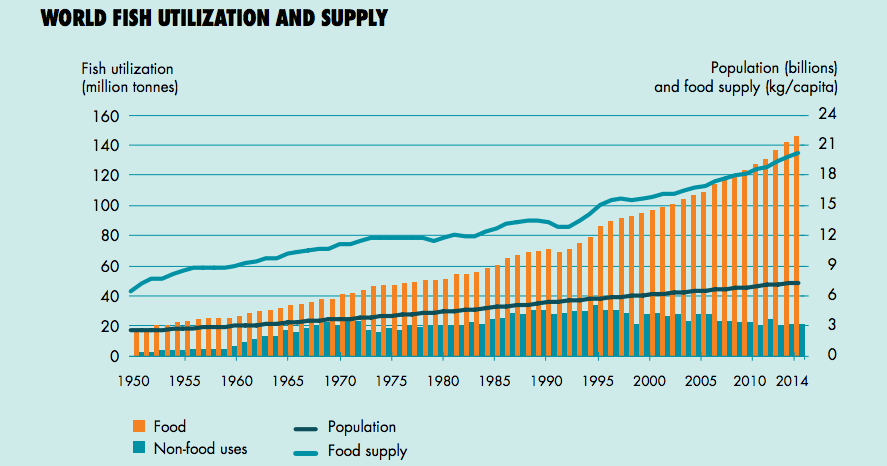
A few years later, NASA share a well debated statement, “Multiple studies published in peer-reviewed scientific journals show that 97 percent or more of actively publishing climate scientists agree: Climate-warming trends over the past century are extremely likely due to human activities.”
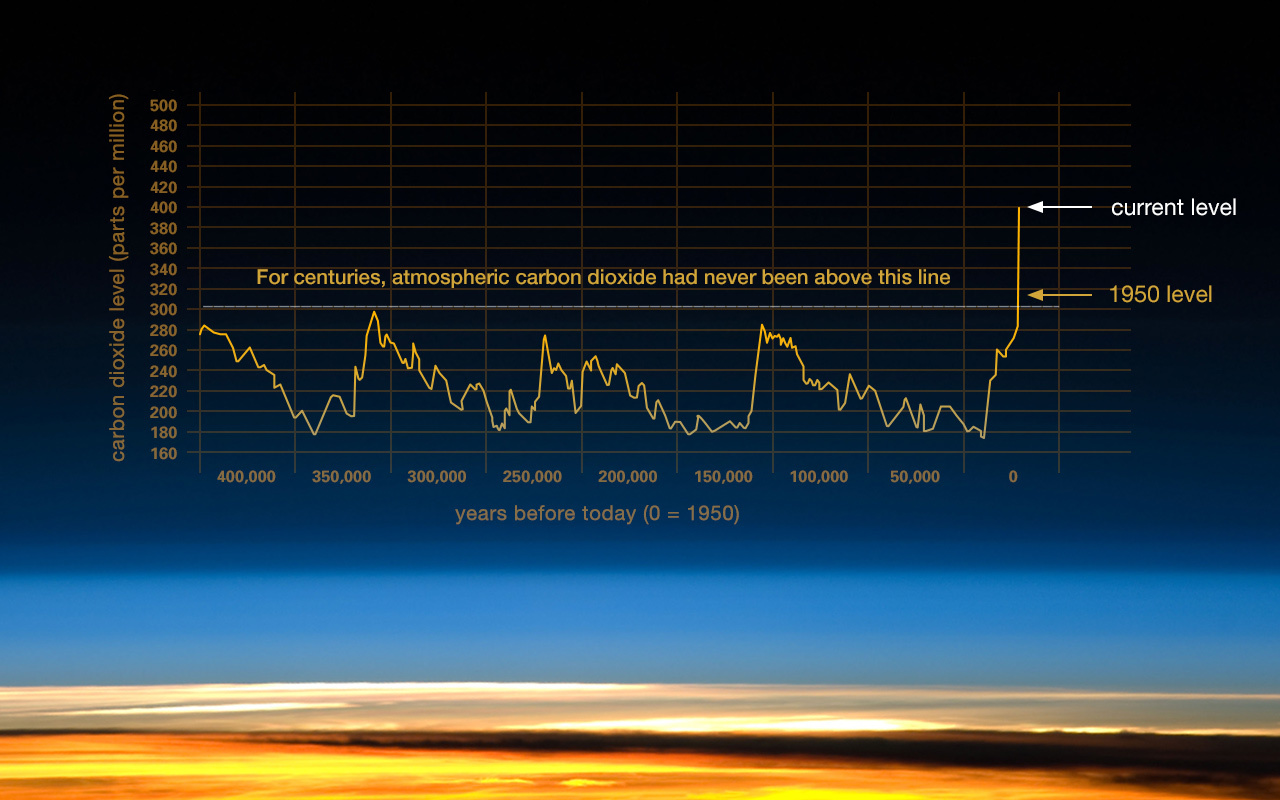
This graph, based on the comparison of atmospheric samples contained in ice cores and more recent direct measurements, provides evidence that atmospheric CO2 has increased since the Industrial Revolution. (Credit: Vostok ice core data/J.R. Petit et al.; NOAA Mauna Loa CO2 record.) Find out more about ice cores (external site).
In 2014, The Center For Biological Diversity stated, “We’re currently experiencing the worst spate of species die-offs since the loss of the dinosaurs 65 million years ago. Although extinction is a natural phenomenon, it occurs at a natural “background” rate of about one to five species per year. Scientists estimate we’re now losing species at 1,000 to 10,000 times the background rate, with literally dozens going extinct every day.”
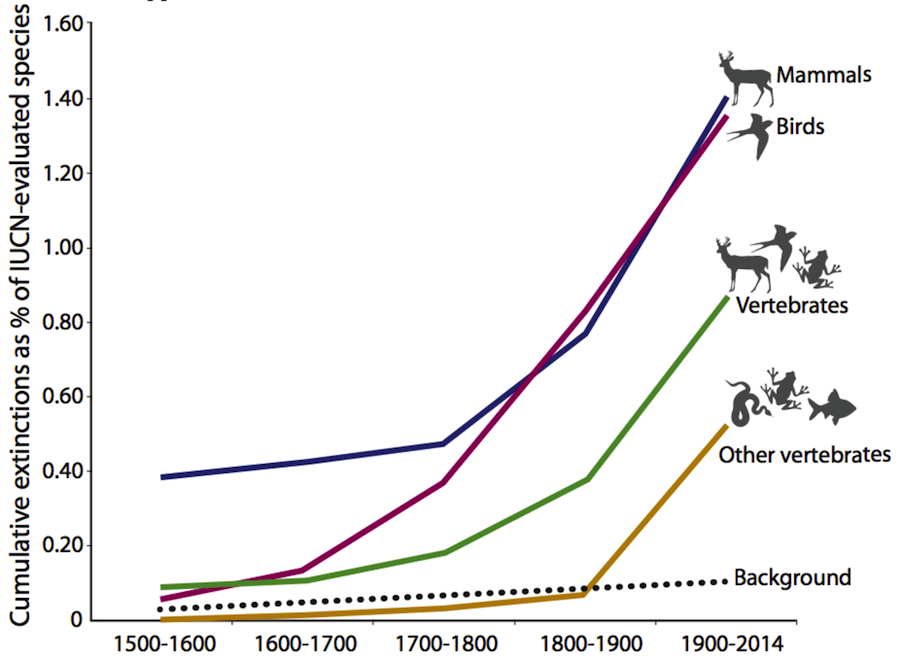
Now, April 2017, one of the 7 ecological wonders of the world, The Great Barrier Reef, which has been around for about 500,000 years, is in terminal condition with large sections dying off. Why now?
James Kerry from James Cook University’s ARC Centre of Excellence for Coral Reef Studies stated, “This is the fourth time the Great Barrier Reef has bleached severely – in 1998, 2002, 2016, and now in 2017. Bleached corals are not necessarily dead corals, but in the severe central region we anticipate high levels of coral loss. It takes at least a decade for a full recovery of even the fastest growing corals, so mass bleaching events 12 months apart offers zero prospect of recovery for reefs that were damaged in 2016.”
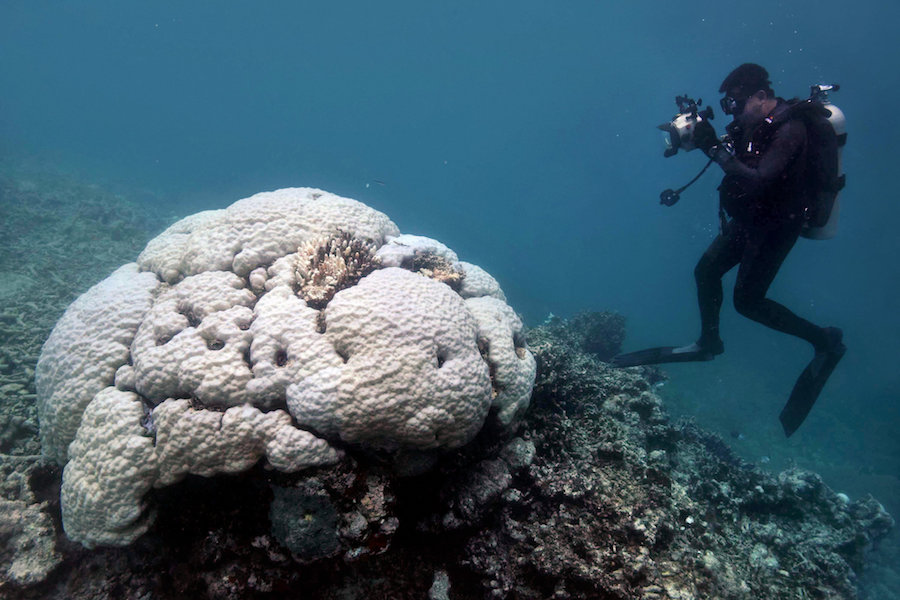
While many disagree and challenge the causes and validity of science, others are becoming inspired and finding the courage to take action.
Economic entrepreneur’s have been innovating and solving problems for a long time. But their focus has been task efficiency and profit. If a business doesn’t make money the lights will go out, however, when the focus is solely profit other factors such as, people or our habitat, tend to be neglected.
“Millennials will change the world decisively more than any other generation.” (Jim Clifton, Gallup Chairman & CEO)
But Something Is Changing
The internet has connected us and offered global transparency like never before. People see these global challenges with more clarity, messages spread around the world in an instant, and people’s empathy reaches further.
In 2006, two headlines made their way around the world which raised the profile of social enterprise: Mohammed Yunus won the Nobel Peace prize for his work in microfinance which helps people in poverty and Bill Gates announced he was shifting his priorities from software development to social impact by moving full time to his foundation.
A great amount of data today is showing a shift in the global mindset as people become more socially conscious. Younger generations are especially eager to build a life that contributes to solving our big problems and provides them a real sense of purpose.
People are starting to change their behavior in response to the changing conditions.
According to a Gallup survey, only 13 percent of employees worldwide are engaged at work.
But at the same time a 2016 Cone Communications Millennial Employee Engagement Study found the following:
- 75% say they would take a pay cut to work for a responsible company (vs. 55% U.S. average)
- 83% would be more loyal to a company that helps them contribute to social and environmental issues (vs. 70% U.S. average)
- 88% say their job is more fulfilling when they are provided opportunities to make a positive impact on social and environmental issues (vs. 74% U.S. average)
- 76% consider a company’s social and environmental commitments when deciding where to work (vs. 58% U.S. average)
- 64% won’t take a job from a company that doesn’t have strong CSR practices (vs. 51% U.S. average)
Millennials aren’t only interested in working as an employee, however. According to a study by Bentley University, 66 percent of millennials said their goal involves starting their own business.
In Comes The Social Entrepreneur
Something I’ve noticed a lot is a stigma that doing good is only for charity and you have to sacrifice making a good income. I’ve interviewed many social entrepreneurs and can tell you it’s quite the opposite.
We all know how to become a doctor, lawyer, or a financial advisor, the path is clear.
But how do you become a successful social entrepreneur? If you’re not familiar with social entrepreneurship, it’s a label given to a person who creates a business or organization as a tool to help solve a social and/or environmental issue by changing the way a system works.
I see business as an incredibly powerful tool. One that can be destructive or positively impact millions of lives. How we approach it will make or break the direction it goes. I personally fell in love with the idea of social entrepreneurship because it seemed like the right approach to business. It appealed to the empathetic activist side of myself.
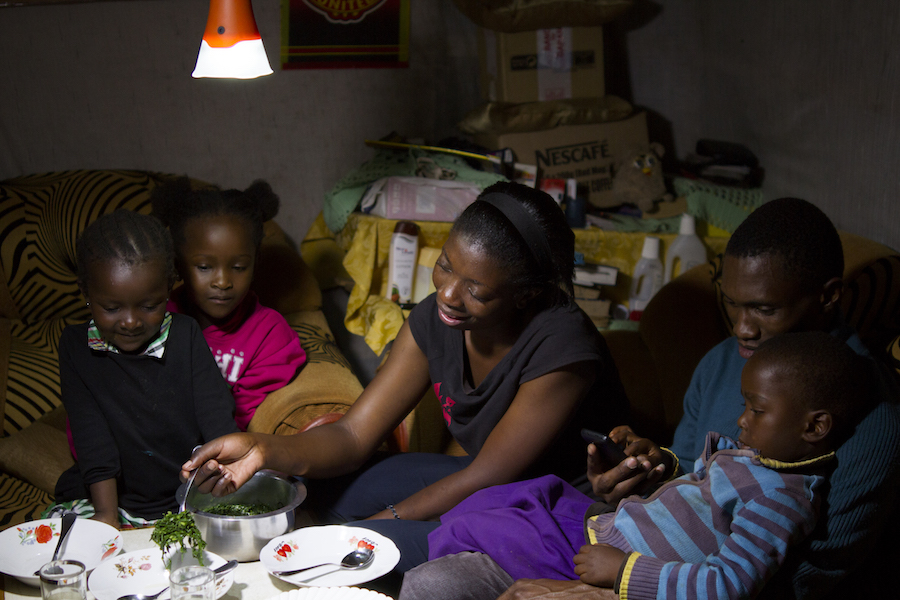
Even though the concept of social entrepreneurship has been around for decades, only in recent years has it become popular and started to reach mainstream. Just a few years ago there was little to no information or University courses. Now all major universities have courses, more information is popping up about it each day, and the number of social enterprises being started is growing.
When this approach is taken, it’s not “work” in the traditional sense, it’s a “mission”. This appeals to people who want more purpose in their life.
As Tony Robbins stated in our interview, when someone is on a mission “they do it because it’s what they’re made for. For them, it’s not work; it serves a higher purpose.” He continued to say that “your labor is one of the most sacred gifts you can give so it’s important to find something that you’re here to play for that’s more than just yourself.”
“I think social entrepreneurship is incredibly important and will play a vital part in redefining the role of business in the world, which we urgently need to do. Our world is facing multiple crises and government action alone isn’t going to be enough to meet our challenges.” (Arianna Huffington, Interview with Change Creator)
A Different Approach
Social entrepreneurship requires a different approach than traditional economic entrepreneurship.
Everything from the intention of the business to the decisions made while in operation.
If you’re focused on one element of success such as, maximizing profits, you will make very different decisions than if you approach the business to maximize your social or environmental impact.
When a person is on a mission, they are putting people and planet first and using the business to create profits so they can scale their impact and make a good living at the same time.
Social entrepreneurs pay attention to the full spectrum of needs by looking at the triple bottom line – people, planet and profit.
Not only does social entrepreneurship use business as a positive force but it also gives a person a true sense of purpose. They are fighting for something believe in and giving back. They wake up each morning inspired.
Money Required
The reason people use business as a tool to address social and environmental problems is because they need a model that earns money to scale impact.
One of my favorite examples is Dr. Alasdair Harris, found of Blue Ventures. He was Change Creator Magazine’s sixth edition cover story and also a Skoll Foundation Social Entrepreneur Awardee.
Dr. Harris was a marine biologist who took research trips to Madagascar and witnessed the downward spiral of the region’s ecosystem. What he saw as healthy and rich forty years earlier as a student had been reduced to dead reef with a few fish or sea creatures.
Dr. Harris became a “reluctant” social entrepreneur. He was a scientist, not a businessman, but had to create a business that had a reliable business model for earning money to support his conservation efforts. Since then, he has not only helped restore the area, but his solutions have scaled up the coast and to other areas of the world.
Some Final Thoughts
I could write a book demonstrating story after story how amazing entrepreneurs just like you and me are taking bold steps to earn a living that scales incredible impact.
This is what Change Creator Magazine is all about. Highlighting amazing people who have figured out how to create a lifestyle of purpose and earn a living addressing our most pressing social or environmental problems. Sharing their strategies and illuminating the path for aspiring Change Creators like you to bring your ideas to life and live with purpose.
I highly recommend you check out our interviews with Jake Orak, Kenton Lee, Jonah Brotman, Becky Straw, and many more.
As the world changes people change with it. Social entrepreneurship is a natural response to a number of changing conditions in combination with human empathy and need for meaning.
People want purpose in their life. They want to pursue a lifestyle of purpose and earn a living addressing our most pressing social or environmental problems.
“Millennials will soon make up 50 percent of the workforce and companies will have to radically evolve their value proposition to attract and retain this socially conscious group,” says Alison DaSilva, executive vice president, CSR Research & Insights, Cone Communications. “Integrating a deeper sense of purpose and responsibility into the work experience will have a clear bottom line return for companies.”
Are you ready to join the revolution and be a Change Creator?
What are you thoughts? I’d love to hear from you in the comments.
You might also enjoy:



